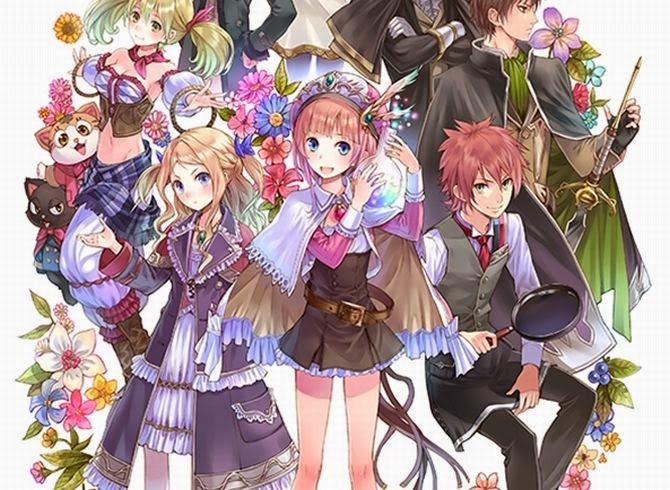 Review by Matt S.
Review by Matt S.
I’ve already reviewed Atelier Rorona Plus’ PlayStation 3 release, and I’m sure if you have a read of that review you’ll get a sense of just how much I love this game.
The game is the same on the PlayStation Vita. In fact, it’s really quite impressive how GUST and Tecmo Koei has been able to capture the same bright vibrancy of the big console game into pocket form. There’s a couple of blips when it comes to the framerate and some environments load into the game slowly, but none of that is enough to impact on the overall quality of the game, which remains very much the same as the PlayStation 3 game. So instead of writing a review that will cover the same ground, I thought I’d do something different with this review; I’m going to instead explain why it annoys me so much that this game (and franchise) isn’t held in higher regard by the mainstream press and community.
Atelier Rorona, Atelier games in general, JRPGs, and in fact any game from Japan that has the misfortune of having a female lead character that isn’t packing guns and burning with generic dark rage is instantly, inevitably, dismissed as being the video game equivalent of a non-ironic Lolita (as in, the book. Which is actually social satire and not erotica at all, but a very unscientific poll I’ve done of Twitter has found that there are still people that don’t realise this). These games are entirely serious attempts at titillation, apparently, and so they can’t possibly be good games.
This sheer ignorance about the content of these games is, in fact, institutionalised. Atelier Rorona Plus has an R18+ rating in Australia, and Atelier Totori Plus on the PlayStation Vita before it suffered the same fate. For the most out of context and indefensible reasons both games have been deemed Adults Only, even as western blockbusters like Assassin’s Creed IV and Call of Duty: Ghosts land MA15+ ratings from the same Classifications board; these are wholesome for children, apparently, despite the extreme bloodshed that these games represent.
It’s not just the Atelier games that attract such a reputation, either. A game such as Senran Kagura Burst, attracts articles from people who haven’t even played it, but apparently think they know enough about it to demand that consumers boycott it. Love Plus is a Japanese dating game franchise that has never even been localised into English, but this hasn’t stopped people calling it “creepy” based on their self-proclaimed expertise on the game and entire genre based on watching a promotional trailer that isn’t even in their language.
This culture of judging the content of Japanese games without even having playing them annoys me no end, because the game’s reputation almost never matches the game’s reality. Love Plus is great. Senran Kagura is self-reflective rather than exploitative. And the Atelier franchise is downright innocent.
This is a review for Atelier Rorona Plus, so let’s talk specifically about that game; you’re not going to find a game that is more happy or cheerful than this game. Yes, there are one or two slightly off colour jokes (which are clearly, specifically, painfully obvious that they are jokes), but for all Rorona’s reputation for being, apparently, sexually explicit (R18+ rating, remember?), this is a game which is bright and youthful. There’s no explicit violence (even in the combat, attacks deliberately lack impact, and there’s no blood; you’ll see worse in a Bugs Bunny or Tom & Jerry cartoon), and while there are some words that might imply some sexualised content in a rare moment or two of dialogue, there’s no visual depiction of anything sexual.
Instead, what is in Atelier Rorona Plus? It’s a story of a young, resourceful woman and her coming of age from an apprentice alchemist to a master of the “science”. It’s a story in which characters from all walks selflessly help other people for minimal reward. It’s a story in which the main antagonist – the state – isn’t really an enemy at all. The lack of any kind of hostility within this game is surprising (because it is the games industry) and refreshing, because it’s nice to have a change from what the industry usually peddles.
It’s a game which features an overload of colour, and environments and characters are clean and wholesome. It’s a game which supports a healthy attitude towards both male and female roles within a game. Atelier Rorona Plus is a game that shouldn’t be criticised and demonised, not least by people that can’t be bothered understanding it before dismissing it.
This is a very rewarding game, with something like 30 different endings to experience, depending on how well you play, and more side quests, optional missions and challenges and places to explore than most other JRPGs out there. I don’t think there is a franchise out there that has such a single minded dedication to fun as the Atelier franchise, and Rorona Plus is one of the finest of that franchise. You’re doing yourself a great disservice if you ignore the game based on the reputation it has in some corners.
– Matt S.
Editor-in-Chief
Find me on Twitter: @digitallydownld










